Eight inspiring teenagers — representing each branch of the armed forces — looked beyond their own difficulties during the pandemic and found ways to offer their unique skills, talents and passion to help others get through hard times.
Whether it was sending boxes of gifts to critically ill children who couldn’t travel to fulfill their Make-A-Wish dreams; flying on volunteer missions to deliver medical supplies to rural areas; bringing healing music to those in need, or helping out home-bound neighborhood parents with child care, they have made a difference.
Those experiences, and the ways they have found to put their abilities to use, also put this year’s recipients of Operation Homefront’s Military Child of the Year awards in a unique position to offer sage advice to other military teens, their parents and, indeed, all of us on how to rise above difficulties and thrive.
“When I look at all these winners, I’m just blown away by how these military kids take a problem … and they figure how they can help themselves and help others,” said Rebecca Benson, mother of Space Force winner Grant Benson. “They make it better for others. It’s such a selfless way to approach things, especially through COVID.”
Two of this year’s winners approached their parents’ new duty assignments in creative ways. One who, as the child of a National Guardsman had never experienced a permanent change of station, chose to move with his mother — at the family’s expense — to Germany on her unaccompanied tour ; another was able to graduate early so he could move with his family and avoid having to start at a new school in his senior year.
The youth represent the Army, Navy, Air Force, Marine Corps, Space Force, Coast Guard and National Guard. An eighth student received the award for innovation.
All told, the eight recipients logged 1,473 volunteer hours in the 12 months before the nominations. They’ve experienced a combined 40 military moves, and a cumulative 115 months of deployments of their parents in their lifetimes.
All eight are honor students. Five of the students are musicians; six have been or are on sports teams in their schools.
And 13-year-old Sophia Jordan made Operation Homefront history, becoming the third child in her family to be named Military Child of the Year for the Marine Corps, following her brothers Michael-Logan in 2014 and Jaxson in 2019.
“Each awardee is a stellar representative of the larger community of two million amazing military kids, all of whom should be tremendously proud of the strength they add to their families, their communities and our nation,” said retired Air Force Brig. Gen. John I. Pray Jr., president and CEO of Operation Homefront.
The youth spent two days touring Washington, D.C., before the April gala in their honor. Each received a $10,000 grant, a laptop and other donated gifts.
“It was one of the best weeks of my life,” said Elena Ashburn, Operation Homefront’s Military Child of the Year for the Army. She enjoyed having her family come to Washington to share the experience and the gala, and she is keeping in touch with the new friends she’s met — the seven other MCOY recipients. “We’ve all led the same lifestyle, but all have different backgrounds and stories,” she said.
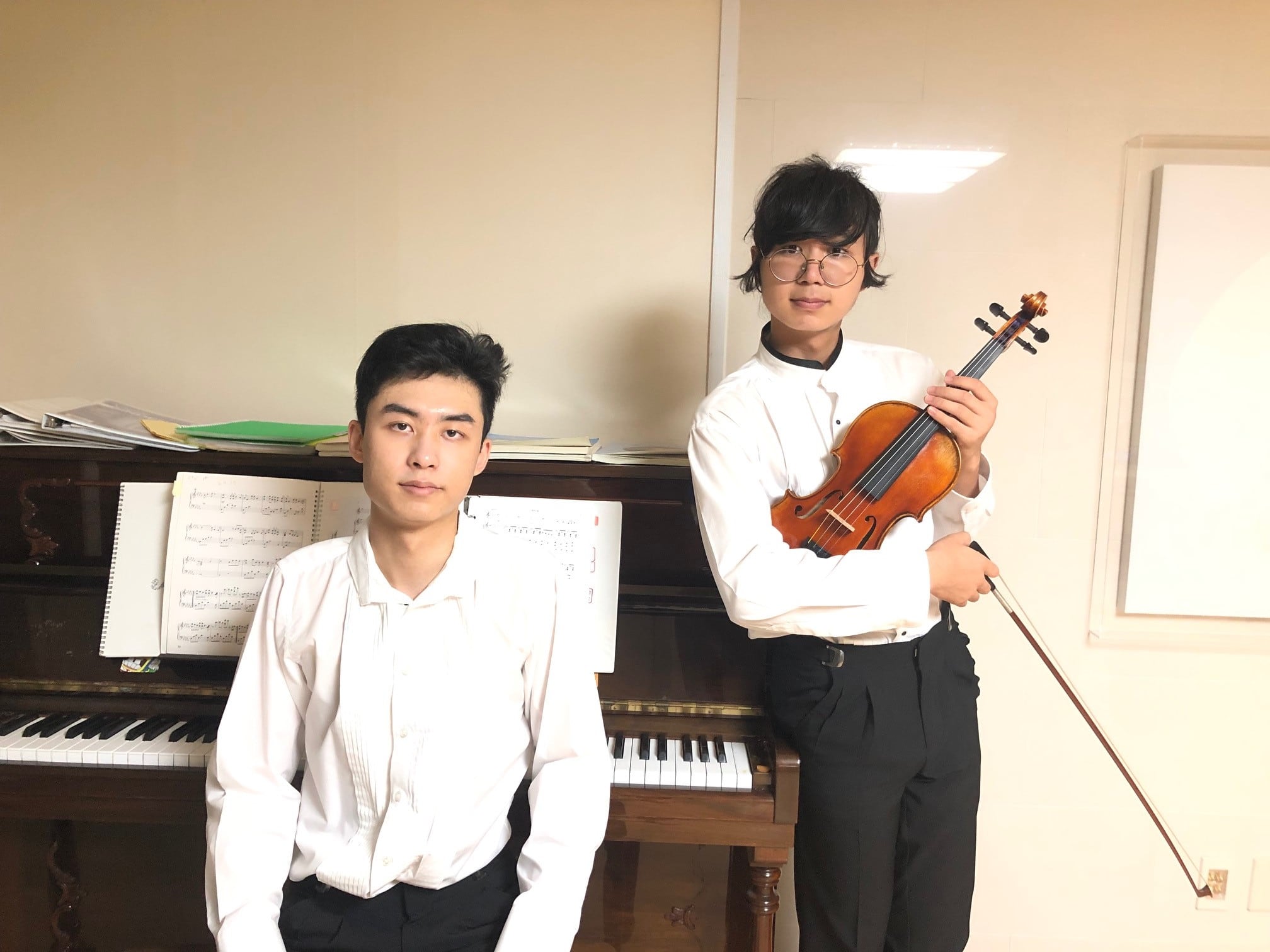
INNOVATION: David Lee, 18, South Korea
David Lee realized how people were suffering mentally during the pandemic. And he could see the smiles and soothing effect his music had on his grandparents. He could also see the effects when he volunteered to play his violin for seniors and patients at rehabilitation centers.
Thus, the idea for Music Echoes was born. David, 18, a senior at Osan Middle High School in South Korea, created the project with his 19-year-old brother Ralph, an accomplished pianist. Their goal is to spread their music to the entire world, he said, “so everyone can listen to it.”
“During quarantine and everything, I was thinking of starting something to help the world with my passion … my instrument, my violin,” he said.
Their offerings include some of the brother’s compositions as well as other non-copyrighted music they find on the Internet. They post new selections every couple of months on their website and social media sites.
They’ve delivered their music to about 15,000 hospitals and rehabilitation centers, 1,000 orphanages and 500 nursing homes, David said.
David is the 2022 Military Child of the Year for Innovation. He’s the son of U.S. Army Reserve Warrant Officer 1 James Lee and Jea Park.
One of the experiences that helped spark the idea came in 2019, when a woman approached him in tears after he had played at a rehabilitation center. She asked if he could play at her funeral.
After he moved to South Korea with his family — his ninth military move — he wasn’t able to travel for the funeral because of COVID restrictions. But he sent a video to the hospital for the funeral, where he played “Cinema Paradiso,” by Ennio Morricone.
The accomplished violinist has won awards in competitions in the U.S. and abroad, and has performed in Carnegie Hall. Among his many awards, to name a few:
- 1st prize in American Protege International Concerto Competition
- 1st place in 21st Seoul National Student Music Scholarship Competition
- 3rd place in Charleston International Baroque Competition
- 1st prize in New York Concert Festival Concerto Competition
- Grand Prix winner in New York Concert Festival Spring International Competition
- 2nd prize in European Composers Competition, Austria
He plans to major in both music and psychology in college, he said. He’ll be taking a gap year this year, because he has landed an internship. In the future, he’s considering “becoming an entrepreneur and clinical psychologist and investor,” he said.
Five words describe him, he said: Passion, perseverance, purpose, sharing and caring.
His advice to other military kids: “Find your purpose in your life and your passion. Persevere, and that will make you happy in life. I believe you can take it everywhere you go, even when you PCS.”
His advice to military parents: “Have a plan for everything and everywhere.”
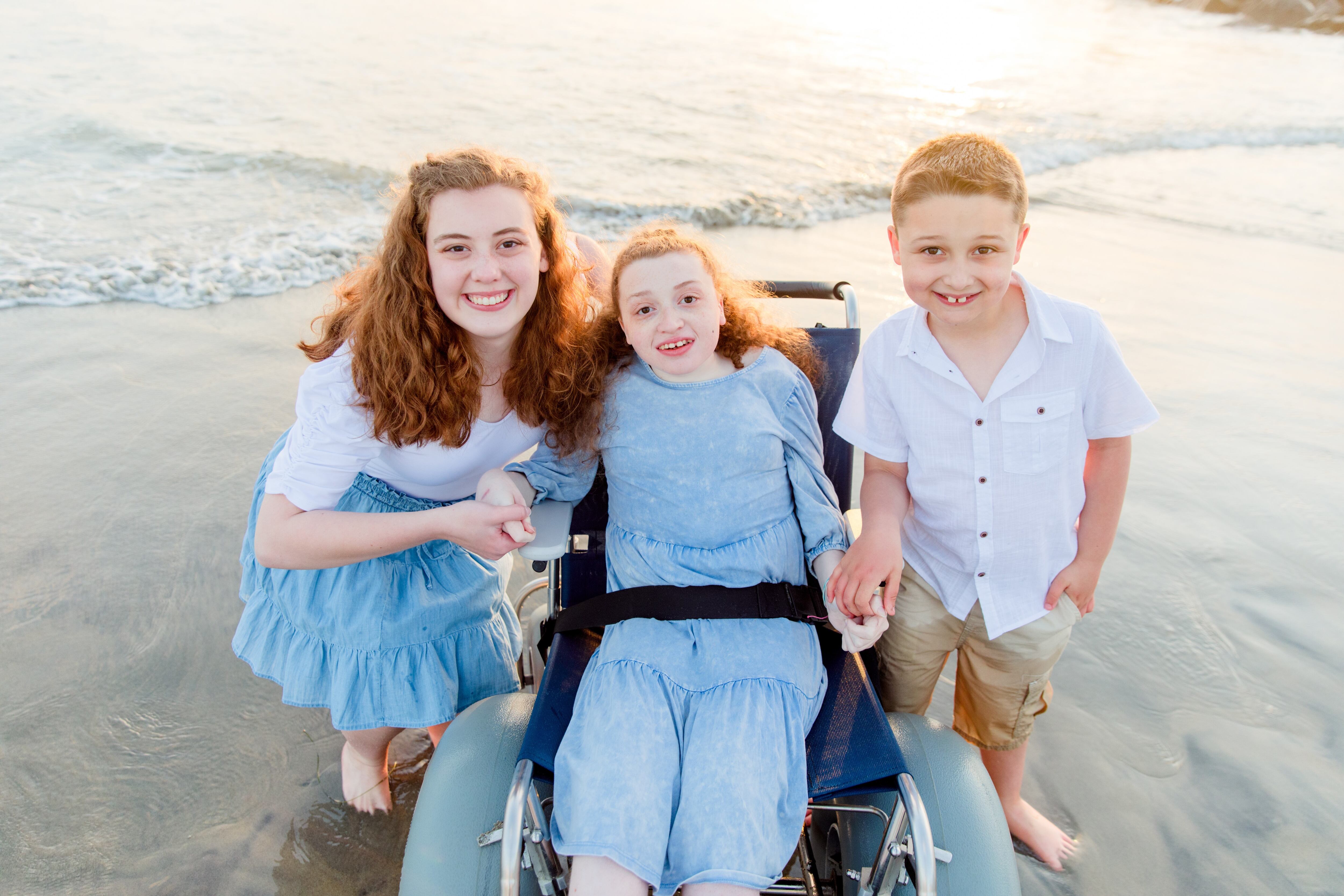
AIR FORCE: Anna Cummins, 16, Colorado Springs
Anna Cummins’ experiences with her family, including her special needs sister, and as a volunteer have helped shape her character and her goals.
“Going with my sister to her appointments, I’ve seen what a doctor’s bedside manner can do,” said Anna, whose goal is to be a physician’s assistant or doctor. She hopes to join the Air Force Reserve.
“I want to give back to my country because it has given me so much,” said Anna, 16, Operation Homefront’s Military Child of the Year for the Air Force. “I’ve seen with my dad how amazing some of the benefits are.”
Her father, Lt. Col. Matthew Cummins, is a flight commander and evaluator pilot assigned to the Air Force Academy’s 70th Flying Training Squadron. Anna’s mother, Amy, is a registered nurse.
Anna says her most important quality is her compassion. “I like this whole idea of putting others before yourself and helping people,” she said.
She’s a sophomore at Air Academy High School in Colorado Springs, where her sister, Maddy, 18, is a senior. Her brother, Luke, is 9. Maddy lives with Rett syndrome, a neurological disorder, and requires around-the-clock care. She is unable to walk, talk or use her hands, and communicates through an eye-tracking device.
Anna has been a voice for those with special needs, but she’s also a voice for siblings of those with special needs. In middle school, she founded Special Siblings, an Instagram-based support community for students with siblings who have significant disabilities.
One of her next goals is to start a program at military installations for siblings of military children with special needs.
Her volunteer work includes a number of efforts along medical lines. During the COVID pandemic, she was a mission assistance volunteer with Angel Flight, flying with her dad, a volunteer pilot for the organization, to deliver critical medical supplies to rural hospitals. “It’s amazing how much they needed things like masks and gloves,” she said. “They were running low, and no one could get new ones.”
Anna also volunteered last summer at Evans Army Community Hospital at Fort Carson.
“Because of COVID, the stress on the nurses was a lot higher than it used to be.” she said. “I really think it was a great opportunity for me to learn, but also for the nurses to get some help — even with small tasks like changing out the sheets, grabbing stuff for a parent or filling up water containers. Those small things saved the nurses some time in their day so they could focus on patient care.”
Between her volunteer work at the base hospital, the Children’s Hospital Colorado and the American Red Cross, she donated 266 volunteer hours in the previous year.
Meanwhile, she’s an aspiring pilot who is a tech sergeant in the Civil Air Patrol and founded the Aviation and Aerospace Club at her school. She’s maintained a grade-point average above 4.0 in high school, and is captain of her junior varsity tennis team.
Her advice to other military kids: “Find someone you can talk to. During the pandemic with quarantine and when school was remote, I was struggling. I’m an extrovert. My math teacher let me vent to her and it really helped.”
Her advice to military parents: “Make sure you emphasize that your children aren’t defined by their parents’ occupation or by the location. Sometimes it can feel like your entire life revolves around the military — where you live, what school you go to, the friends you have — all of that depends on the military sometimes.” Parents need to make sure their child knows they’re more than that military person’s daughter, that they’re their own individual person, she said.
“Just make sure your child knows they’re loved.”
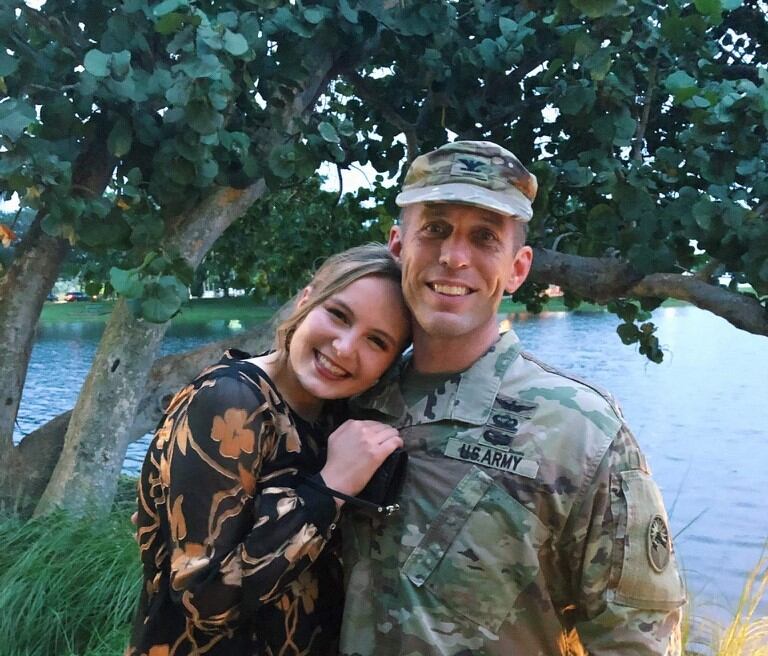
ARMY: Elena Ashburn, 18, Pembroke Pines, Florida
For Elena Ashburn, being named Operation Homefront’s Military Child of the Year for the Army gives her another opportunity to get the word out to people about how they can help military teens bloom and flourish.
And that goes to the accomplishment she’s the most proud of — co-founding the organization Bloom: Empowering the Military Teen two years ago with her best friend, Matthew Oh.
They started the organization after their families left Carlisle, Pennsylvania. Elena moved to Florida and Matthew moved to South Korea. Struggling with yet another move, they decided they could help other military teens who were going through the same upheavals. “Bloom” is a website produced by, for and about military kids worldwide.
“It’s about connecting them to other military kids and connecting them with others so they know they’re not the only ones going through this,” said Elena, who is the daughter of Col. Matt Ashburn, director of the Commander’s Action Group at U.S. Southern Command, and Katarina Ashburn.
Bloom has gotten attention at the national level, after the National Military Family Association approached them to partner on surveys of military teens in 2021 and 2022, helping them compose and distribute the survey. The Bloom teens have written “The Field Guide to the Military Teen,” with NMFA, for those in communities with military teens.
“Elena’s courage when faced with a new opportunity or challenge has always had us in awe,” said her mother, Katarina. “Whether she was running for class president as a freshman who was new to the area and had homeschooled for the last eight years, formally auditioning for a youth orchestra for the first time, or pursuing her passion for Shakespeare on stage, Elena would always find enough courage to try and would persevere even in the toughest moments.
“We admire her tenacity and know it will take her so far in life,” she said.
She has experienced five military moves in her 18 years, the latest to South Florida, where she attends Cooper City High School and is print editor-in-chief of the school newspaper. Her writing has won several awards, including a first place poem in Chapman University’s Holocaust Art and Writing Competition. She’s pursued her passion for performance in dance, music and theatre; and has acted on competition teams with a Shakespeare troupe. Since first grade, she has played violin, performing with orchestras and at weddings.
Elena, who plans to major in public policy in college, has worked as an intern for the organization Open Primaries, which advocates for all states to allow all voters to vote in a primary election without having to register with a political party.
A congenital heart condition has stopped her from doing some things athletically, but she described herself as pretty active despite it.
Having that heart condition “is normal to me,” she said. “I’ve always been able to make do with the body I have. … Singing and dancing can be strenuous, but it’s a lot about understanding and listening to my body and knowing when it’s time to stop. I also appreciate that my body is working so hard. It’s awesome it’s able to do this at all. … I’m also fortunate to have had great doctors.”
Her advice for other military kids: Elena has no shortage of advice. That is one of the reasons she started Bloom. “Take advantage of the privilege and opportunities that come with being a military child,” she said. “There are a lot of hard things, but so many things you can take advantage of. You’re lucky to travel the world and the country.
“Never forget you’re not alone, especially if you’re the only military kid in the civilian community. So many others are going through this. Even if they’re not in your local community, they’re out there, and are going through it.
Her advice for military parents: “Listen, because we may not always want to talk, but when we do, we have so much to say. It’s hard enough being a teen, and when you put the military life on top of that … Supporting and listening is the best thing you can do for your teen.”
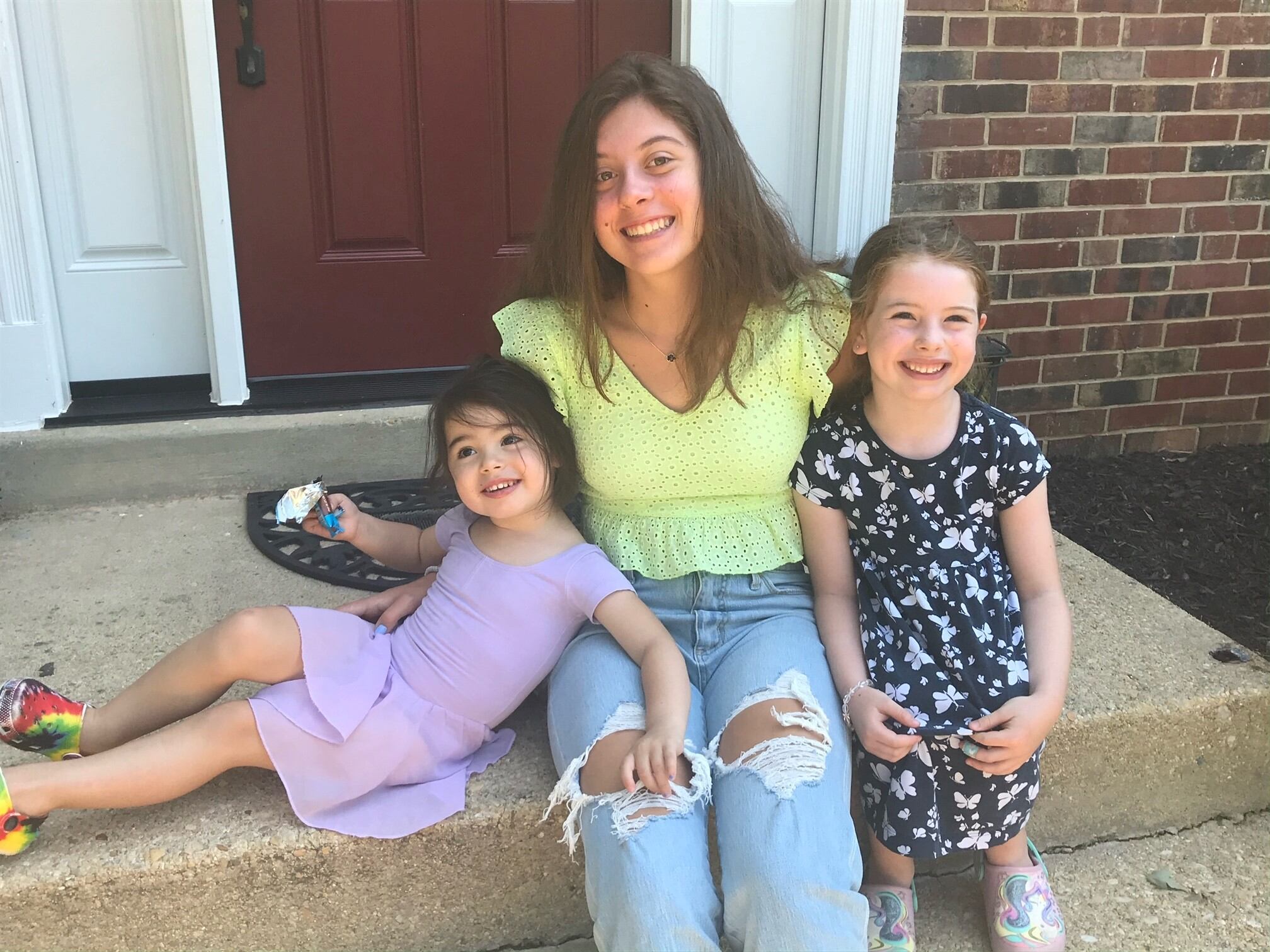
COAST GUARD: Kathryn Alonso, 17, Vienna, Virginia
As the pandemic forced many of the parents in her neighborhood to work from home, Kathryn Alonso began helping them out by babysitting, taking the children out for picnics, conducting sports camps and other activities.
That was a life-changing time for her, she said, as it helped her decide she wants to be an elementary school teacher.
Kathryn, 17, was nominated by one those neighbors for Operation Homefront’s Military Child of the Year for the Coast Guard.
The senior at George C. Marshall High School in Falls Church, Virginia, is the daughter of Capt. Ricardo Alonso, chief of the Office of Marine Environmental Response Policy in Washington, D.C., and Michelle Alonso, who is self-employed.
She has a 4.0 grade-point average and is a member of the National Honor Society, and won the “best motivator” award from her track team; she’s been in her school choir all four years in high school.
But the overwhelming aspect of Kathryn is “her big heart and willingness to help others,” said her mother. “Whether in school, in our neighborhood … she’s always been involved and loved all forms of community service.”
Kathryn “always finds the positive in every situation,” her mother said. “Whenever we move, having to leave friends, go to new schools, change sports teams, watch her grandpa decline with Alzheimer’s, be online for over one year of school due to COVID … she always makes the best of the situation she is in and finds a way to make it a positive experience. I love that about her.”
One of Kathryn’s passions is volunteering for the Alzheimer’s Association. She and her grandpa had always been really close, she said. “I got involved with the Alzheimer’s Association after seeing what he went through,” she said. She’s also volunteered for other organizations such as Special Olympics and Best Buddies. She helped a local diner with fundraising for local families and Afghan refugees.
Her advice for other military kids: “Be a part of your community as much as you can, and take part in clubs and sports. Keep in touch with your friends. I’ve kept in touch with friends I met in Puerto Rico when I was in pre-school and kindergarten. It’s really great and amazing to know people across the entire country. We’re lucky to be able to experience that.”
Although they departed Virginia in one of their five military moves, her family would come back to the commonwealth every summer to visit. “That helped a lot when we moved back,” she said.
During all but one assignment, the family has lived in the civilian community, her mom noted. “We’ve always worked hard to help them stay in touch … to give them that sense of stability,” said Michelle Alonso. Also, she said, the Coast Guard is small and “you never know where you’ll end up. We’ve crossed paths with people at different duty stations.”
Her advice for military parents: “Sign up your kids for different things in the community,” Kathryn said. “Especially when they’re younger, it’s hard for kids to get to know people. By signing them up for sports they can meet a lot of people. My mom also met a lot of people through my soccer teams. And my mom volunteered a lot with my school and my brother’s school.” Not only did that help the school, she said, but it helped all three of them get to know what was going on in the community.
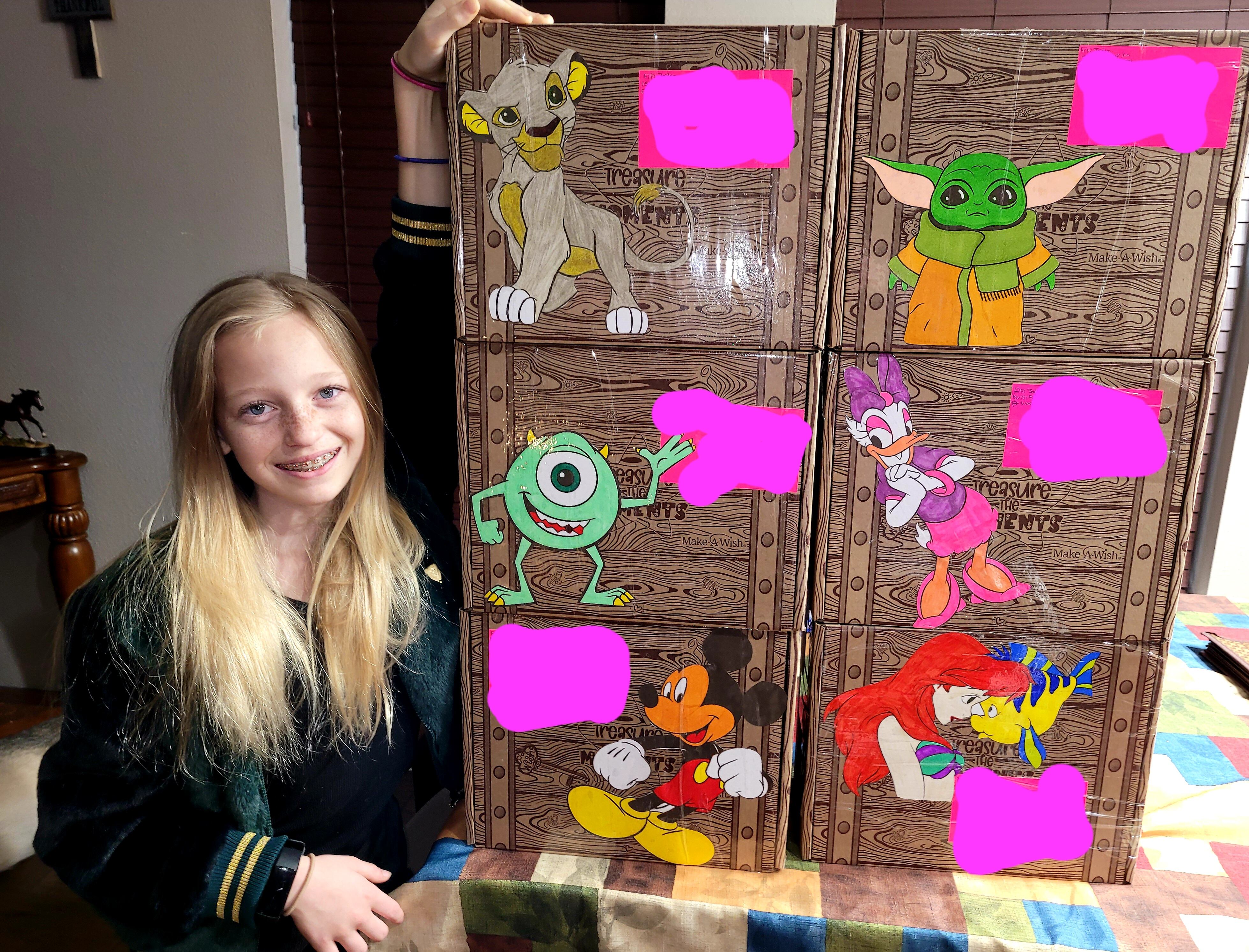
MARINE CORPS: Sophia Jordan, 13, Fort Worth, Texas
During the pandemic, Sophia Jordan began thinking about all those critically ill children who weren’t able to travel. So, she created a way to spread some personalized sunshine for these children while they were waiting on for their wishes to be fulfilled through the Make A Wish Foundation.
Through her connections with the foundation, she began making “Sunshine Express” boxes tailored to each child and filled with goodies. She gets her friends — at times, her whole school — involved, and they put together the boxes that are sent all over the country.
“What makes me happy is seeing videos of them opening up their boxes and seeing them smile,” Sophia said.
Operation Homefront’s Military Child of the Year for the Marine Corps the daughter of Master Gunnery Sgt. Christopher Jordan, regimental operations chief with the 14th Marine Regiment at Naval Air Station Joint Reserve Base Fort Worth, Texas, and ReBecca Jordan, a registered nurse who is currently a stay-at-home mom.
Sophia has the distinction of being the third child in her military family to be named Marine Child of the Year, following brother Michael-Logan in 2014 and brother Jaxson in 2019.
When they found out she had won the honor, the family not only congratulated her and expressed their pride, they passed on to her the Operation Homefront hoodie that had been Michael-Logan’s and then Jaxson’s, she said.
Sophia gets lists of children from the Make a Wish Foundation, and generally sends out at least 15 Sunshine Express boxes a month, including more than 100 in 2021. She collects donations, which helps pay for the items and postage. “She knows how to shop smartly,” her mom said. Each box always contains certain things like cake mix and frosting, so the child can make cupcakes with their family, and stuffed animals they can bring to medical treatments. She tailors extra items to each child’s interests, whether they’re age 3 or 18.
“When she takes the boxes in to the post office, the employees say, ‘Oh, the fun boxes! They make us so happy,” said her mother.
Sophia decorates the boxes with her own artwork, also tailored to the child’s interests, and includes a personal note in each box, Her friends write notes, too. She recently created works of art to be auctioned off at a fundraiser for the Make A Wish Foundation.
Of all Sophia’s accomplishments in her short 13 years, the Sunshine boxes are the most important to her, she said. “Dealing with my own health challenges, I know what it’s like waiting for a wish, and thinking it might not come.” As these children wait for their wish, she wants to boost their spirits with a symbol of hope that their wish is coming, she said.
In addition to her work with the Make A Wish Foundation, she volunteers for the American Heart Association; is an ambassador for the Arthritis Foundation, and is a volunteer for the Purple Playas Foundation’s Chronically Caring Kids. She has fought health issues herself — including lupus, juvenile arthritis and kidney disease. Because of her small stature, she’s been bullied a lot, her mother said….but she also just made the girls’ wrestling team at school.
Sophia is always thinking of ways to help others, her mother said. During the pandemic, when students were struggling with remote learning, Sophia was thinking about how difficult it was for teachers. Remotely, she pulled together a video with her fifth grade classmates to show their appreciation, and worked with the principal to set up a Zoom call for the class to surprise the teacher.
She’s maintained a 4.0 grade-point average at Pike Middle School in Fort Worth, and participates in student government, drama, music and cheerleading.
She’s made four military moves with her family, and her father has been deployed a cumulative total of more than three years during her lifetime. He was wounded in Iraq in 2006, before she was born, in an attack that killed a fellow Marine.
Her advice to military children: “Remember we all struggle in some form or fashion. Approach each day with kindness,” she said. “An act of kindness can be as simple as giving someone a smile or an encouraging word. You can build on that kindness by finding a need in your community and filling it through volunteering. To truly be the repairers of the world starts with a simple act of kindness.”
Her advice to military parents: “You’re strong. If one of you is deployed, and you’re the only parent there, know that you’re not alone. You’re doing amazing. You shouldn’t think you’re not doing enough, because you’re doing more than anyone could imagine.”
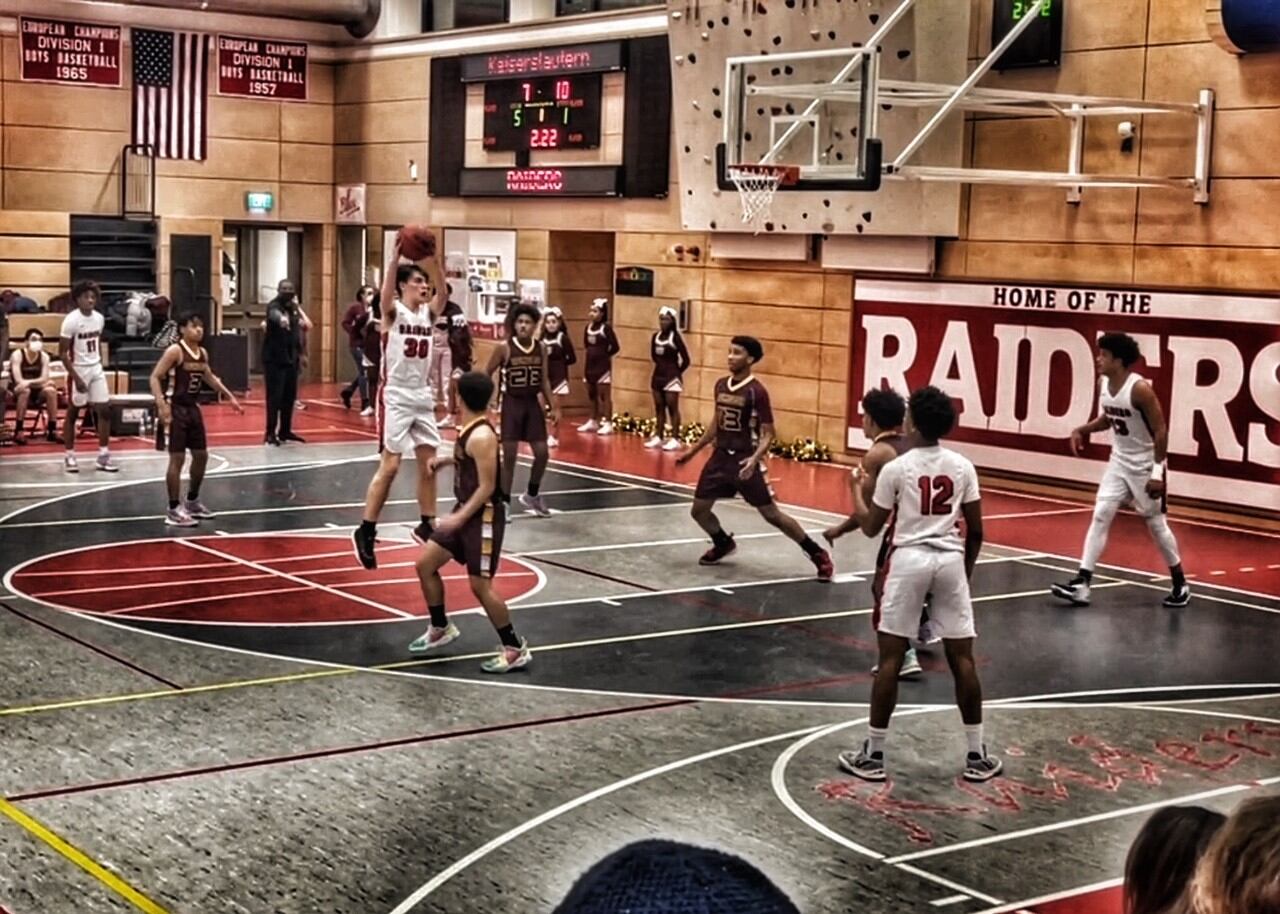
NATIONAL GUARD: Andrew ‘AJ’ Stone, 16, Germany
Andrew “AJ” Stone is a military kid who had lived in one place all his life — until he made the extra effort to move, when he didn’t have to, with his Air Force Reserve mother on an unaccompanied tour to Germany.
“I’ve always wanted to travel abroad. … I was interested in experiencing a different culture,” said AJ, 16, the son of Col. Andrew Stone, director for joint strategic plans, policy and international affairs for the Ohio Army National Guard, and Air Force Reserve Lt. Col. Tanyah Stone, a program manager in Ramstein, Germany.
So when his mother found out she’d be assigned to Germany for a year’s unaccompanied tour, they decided he’d go with her at the family’s expense. He considered it an opportunity to experience the lifestyle so many other military children have.
Although he couldn’t apply to enter the Defense Department school on a space-available basis until arriving in Germany last September, they found out once they arrived that there would be space for him as a sophomore at Kaiserslautern High School, he said.
That’s been the most eye-opening experience: moving to a new place overseas for the first time, moving away from all that was familiar, including his Ohio school and the people he’s known for so many years. Now, he’s met many new friends and is taking advantage of the experience. “I love going and seeing and experiencing new things. Within a day, we can go to three countries,” he told Military Times just after he and his mother had returned from a vacation in Paris.
His mother describes AJ as very independent, mature, driven, a hard worker, and “always willing to help and try to leave the world a better place than when he found it.”
That help has come in a variety of ways. He recently chose to give some of his clothes to teenage refugees from Ukraine, who had to leave their parents and belongings behind and arrived with just their passports.
AJ also has found he can make a difference by speaking up.
Last year, when his school district announced a promotion offering $100 to youth to encourage them to get the COVID vaccine at an upcoming school vaccination clinic, AJ sent an email to the superintendent arguing that the youth who had previously received the vaccine should be eligible for the $100, too.
AJ had already gotten the vaccination, but the extra $100 wouldn’t have benefited him. He was leaving the school district before the clinic, his mother said, but he believed other kids should benefit. The superintendent agreed to give the $100 to every kid who got the vaccine where it was in the clinic or not.
His experience before leaving Ohio led him to one of his most important accomplishments, he said: speaking up and becoming an advocate for a change in state law that would help military children and others moving out of the state. He was enrolled in a community college course through a dual-enrollment program with his Ohio high school, but then found out he would be moving.
Because of the way funding was handled for the dual-enrollment program, the funding stopped because he was no longer a student in an Ohio district. “The college said since there was no funding, he would have to take a “W” (withdrawal), and that stays on the college transcript forever,” said Tanyah Stone. That meant a black mark during his college application process, through no fault of his own, she said.
“Thankfully, the community college worked with us and were able to transfer him to another program where it wouldn’t be an issue for him. So, he could have left it there … but he thought about all those other military kids. Maybe their community college wouldn’t have worked with them. What about those kids?” she said.
So AJ, who is also on the Ohio Teen Military Council, led an initiative, meeting with state representatives and education officials, who didn’t realize there was a problem, she said. Now a legislative change is being considered to allow youth to continue that college course in the dual-enrollment program for that current semester without having to take a “W” if they leave the state.
AJ sets goals and works for them, Tanyah Stone said. The straight A student is driven, she said, “I don’t have to nag him about homework. He knows what his goals are, and what it takes to get to those goals.”
Those goals include going to one of the military academies, AJ said.
“He’s just a leader within his school. His friends and teachers respect him. Everyone looks up to AJ because of the example he’s set and the way he handles himself,” she said.
“He wasn’t the best basketball player a few years ago, but he loves the sport and put in the work,” she said. He came from a small school in Ohio to the larger Kaislerslautern school and tried out for the basketball team as a sophomore. He made it, and became a starter. He’s also on a local German basketball team.
His advice for other military kids: Remain independent and help your parents the best you can. Remember there will be times when one parent won’t be there. Help the other parent as much as possible. While he’s lived in one place most of his life, he’s also lived through many of his parents’ deployments, starting with one when he was born. A few months before AJ and his mother left for Germany, his father returned from a year-long deployment.
His advice to military parents: Talk to your child regularly and make sure they’re doing okay, especially when one parent is on deployment and the other is really busy on the home front.
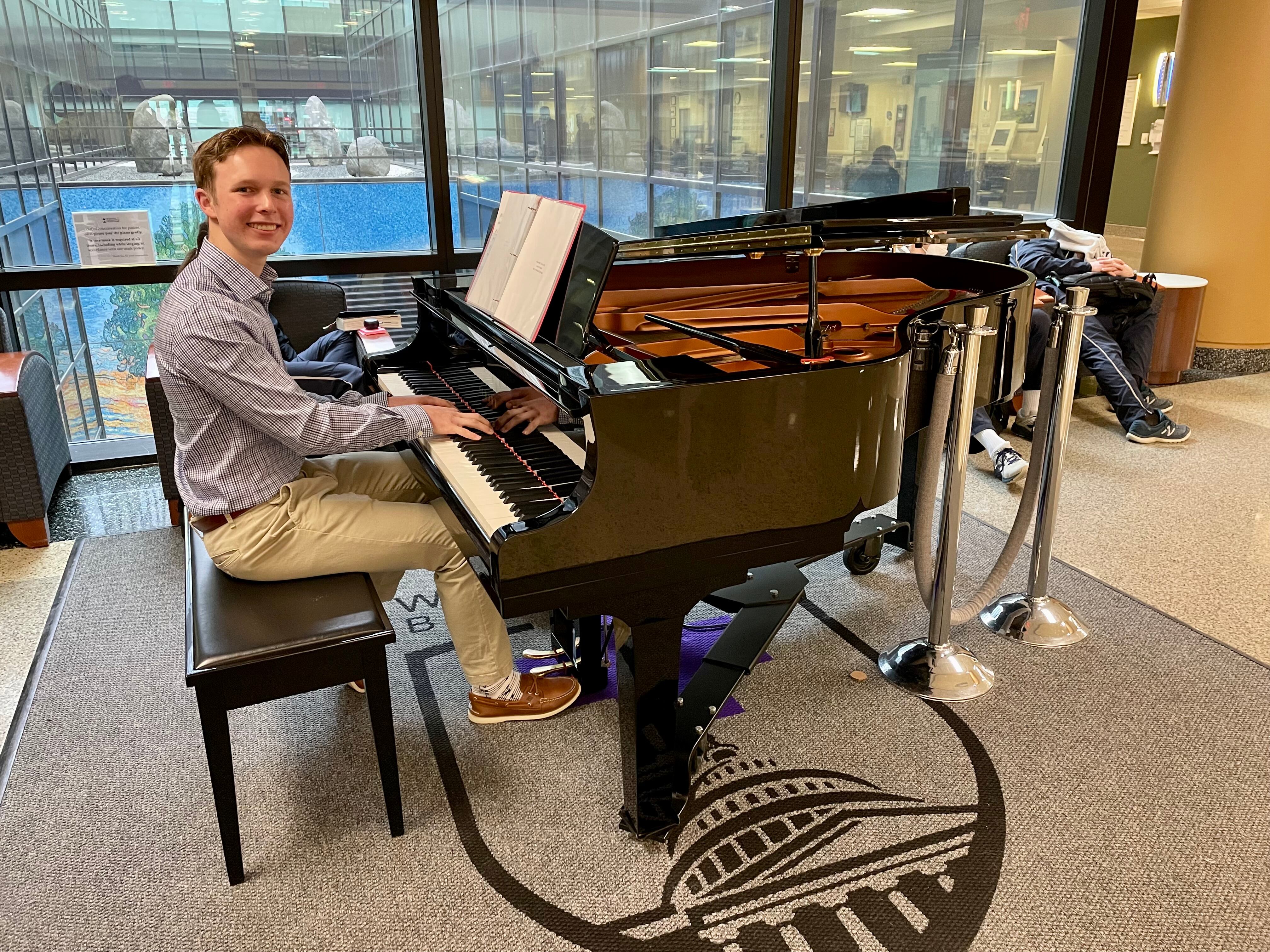
NAVY: Mitchell Matella, 17, Rockville, Maryland
Mitchell Matella’s drive, motivation and love for his family moved him to finish high school early so he could move with his family to the Washington, D.C., area. He graduated at age 16 from Oceanside High School in California.
“I was grateful that earlier I’d already taken some summer courses,” he said. “I really wanted to stay together with my family and not pull us apart.” Although he could have stayed with some relatives in Oceanside to finish his senior year there, it really came down to starting his senior year somewhere else or graduating early, he said.
“I decided I wanted to graduate early because I already had enough credits,” he said. “I’d taken extra classes during the year and summer courses. I could still feel a part of my high school and graduate with my friends.”
It was special for him to be able to graduate with his older sister’s class in 2021, he said, and they walked one right after the other across the stage.
COVID made it a little easier to graduate early because schedules overall were more flexible, he said, and he was able to get in the courses he needed. It also helped that he finished middle school in two years. He ranked 10th academically in a class of 458.
The 17-year-old is the son of Navy Cmdr. Thomas Matella, chief nurse anesthetist at Walter Reed National Military Medical Center, and Kristen Matella, a healthcare contract manager.
With all his accomplishments, the most important to Mitchell are the relationships he’s had over the years, and he has maintained them during the family’s six moves. And his most important trait, he said, is that “all my life I’ve always tried to step outside the box, learn new things and master new things. I always put my all into everything I do.”
Mitchell is leaning toward a career in either environmental engineering or mechanical engineering.
He played on the varsity golf team for all three years of high school and volunteered as a mentor and assistant coach for underserved youth in the Pro Kids, First Tee–San Diego program, which challenges youth to excel both on and off the golf course.
He was treasurer of the robotics club, co-captain in the Academic League and president of the chess club, which won the Mira Costa Chess Tournament. During the pandemic, he organized chess team meetings on Zoom. He played the trumpet in the concert band and marching band.
During his gap year, Mitchell has been working at a local Panera Bread and volunteers to play the piano for patients, visitors and workers at the Walter Reed National Medical Center. He also plays the guitar in his youth worship band at church and says he loves “to fill the room with sound. I love how it goes together with all the other instruments so well.”
What’s the secret behind Mitchell’s motivation?
“Not being afraid to fail,” he said. “Plenty of times, where starting a new hobby, starting a new sport or a new instrument, you feel like you’re so far behind everyone else who’s already been in it for so many years. It’s important to give it your all,” and not be afraid of what others might think as you’re a newcomer.
“Everyone was at that point at one time in their life. If you want to get better, you have to start somewhere.”
His advice to other military kids: “The most important thing is to know how to deal with change in your life and to adapt. Maintain your prior relationships. It’s easy to do so with digital technology like FaceTime, Zoom and text, whatever you want to do to really keep those relationships strong. And it’s important at the new location to focus on creating new relationships there … so you don’t feel isolated.”
His advice to military parents: “It’s important to know what your kid is going through, and always be there for them and to talk with them frequently. My family has always been really close. We’ve always gotten together every night at the dinner table when we’re able to and talk about our day, our goals, the hardships we’re going through, so we work it out not only individually, but as a family.”
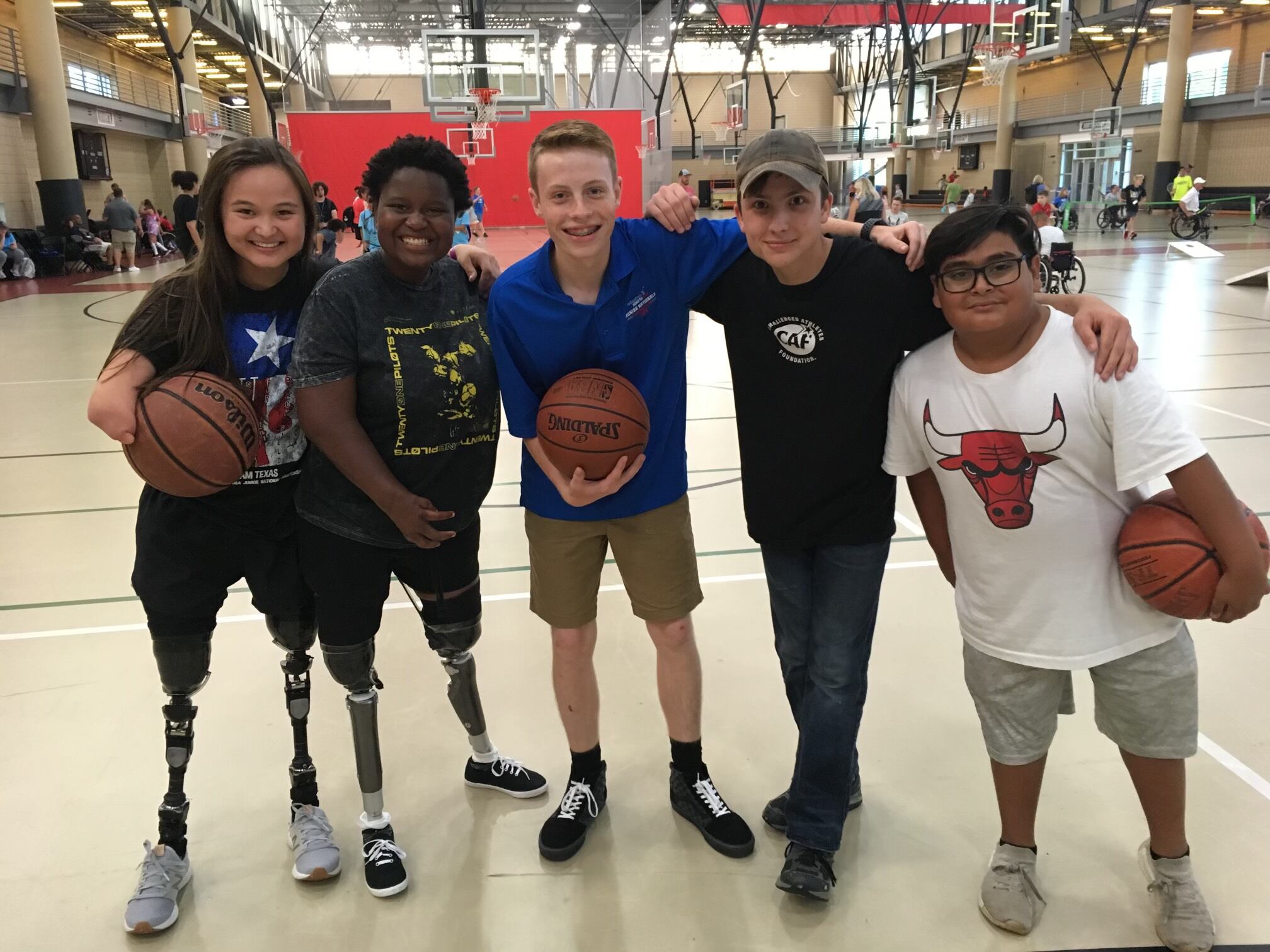
SPACE FORCE: Grant Benson, 18, Burke, Virginia
Grant Benson approaches life in the same calm, steady way he approaches his air rifle shooting competitions, as he aims at a target with a bull’s-eye the size of a pencil tip.
“You learn how to control your reaction to each shot,” said his mother, Rebecca. “It’s a very mental sport. I really see him applying that to life. When things aren’t going well, he’s just very calm and collected. He thinks about what he’s going to say and do.”
Grant is clear-eyed about his priorities in life and his goals. He has accepted a conditional appointment to the Air Force Academy, where he wants to study aerospace engineering. He has his heart set on becoming a pilot, and possibly an astronaut. He’s been recruited for the rifle team at the academy; and his competitive rifle skills have earned him invitations to the Junior Olympics for several years.
The 18-year-old senior at Robinson Secondary School in Fairfax, Virginia, is the son of Col. Todd Benson and Rebecca Benson. Col. Benson is director of requirements for the Space Force at headquarters in Washington, D.C. Rebecca Benson is pursuing a degree as a physical therapy assistant.
The 18-year-old has made seven moves with his family, Rebecca Benson said, but they’ve been able to stay in one spot for the past five years, thanks to Space Force efforts to work with families. He’s been on the rifle team at Robinson for four years and used that experience to get his National Rifle Association Level One certification. That qualifies him to coach, and he volunteers with different organizations such as Adaptive Sports USA and Move United Adaptive Sports, coaching and volunteering in adaptive sports such as air rifle shooting and volleyball.
That volunteer work is a clear priority. He started working with the disabled when he was in the fifth grade, when his father was doing coaching clinics for wounded veterans and others in adaptive sports.
“Grant would walk around and ask the veterans for their autographs,” his mother said. “I loved that. Grant just really looked at these guys as heroes, and they are. He didn’t really see their disabilities. He only saw their abilities. That’s something that grew as he participated with the organizations offering adaptive sports,” she said.
“I really see everybody as an equal, and I lend a hand to pretty much anybody,” Grant said, when asked about his most important trait. “I think it all comes from being a volunteer in adaptive sports. Through these experiences as a volunteer coach for these organizations like Adaptive Sports USA and Move United, I’ve been able to see from a young age that people who are different are able. Everybody’s able.”
The focus that helps him in his air rifle competitions also helped during the pandemic.
“In general, COVID was hard for me, not just because of staying home, but my dad was also deployed during that first year of COVID,” he said. “So, that added another layer of difficulties. I was able to create some outlets in my personal time to get myself away from some of the struggles. I took up fishing again.
“I prioritized my fitness and my health,” he said. “I thought it would be a great opportunity during this down time to focus on some of my personal needs, so working out, running was my goal, but it also helped relieve some of the stress and anxiety at the time.”
Word got around.
“Other parents would call Grant and say, ‘My kid is struggling. Can you take him fishing?’ They wanted to know how Grant was doing this when their kids wouldn’t come out of their rooms,” Rebecca Benson said. “He tried really hard to include others.”
His advice for military children: “A lot of military kids, like me, have struggles with moving frequently, and having to start over. … Look at your move as an adventure. For instance, if you lived in Colorado in the last assignment, think of all the fun things you got to do and take that mindset to the next move.
“Also, the people you meet will be your friends and your support network wherever you are,” he said. “It’s all about keeping those friends in touch because they really are your family,” he said.
When they moved to Virginia, they coincidentally moved near a family they had known since Grant was an infant. Grant became best friends with their son, and they had a lot of interests in common, including Civil Air Patrol, where he is a cadet lieutenant colonel. “It was cool to have someone to bond with so quickly. … The military families we’ve met over the years, we keep running into them because it’s such a small world.”
His advice for military parents: It’s important for parents to look at their new assignment as an adventure … and create that sense of adventure for their children, he said. “Encourage your children to get involved in community service, volunteering in any capacity possible and finding something they’re really interested in” to donate their time. “It’s important for your character, living a life of service. My family, we’re really big on volunteering. We really strive to volunteer in any way we can.”
Karen has covered military families, quality of life and consumer issues for Military Times for more than 30 years, and is co-author of a chapter on media coverage of military families in the book "A Battle Plan for Supporting Military Families." She previously worked for newspapers in Guam, Norfolk, Jacksonville, Fla., and Athens, Ga.





